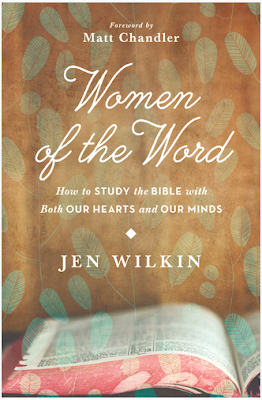This book is a great resource for those who would like to learn how to effectively read their Bibles.
The first thing that stuck out for me was the definition of 'disciple.'
Jen Wilkin writes here:
"Do you know that the word disciple means 'learner'? As a disciple of Christ, you and I are called to learn, and learning requires effort. It also requires good study methods."
Learner.
As disciples of Christ we should be continually learning from his Word. That's what helps us grow deeper and leave the childish things behind.
"When I was a child, I spoke as a child, I understood as a child, I thought as a child; but when I became a man, I put away childish things." 1 Cor. 13:11
"Therefore, laying aside all malice, all deceit, hypocrisy, envy, and all evil speaking,
as newborn babes, desire the pure milk of the word, that you may grow thereby,
if indeed you have tasted that the Lord is gracious." 1 Peter 2:2
We must grow in the Word so that we may not fall for false teachings or be lead away by those who twist the Scriptures.
"Therefore, beloved, looking forward to these things, be diligent to be found by Him in peace, without spot and blameless;
and consider that the longsuffering of our Lord is salvation—as also our beloved brother Paul, according to the wisdom given to him, has written to you,
as also in all his epistles, speaking in them of these things, in which are some things hard to understand, which untaught and unstable people twist to their own destruction, as they do also the rest of the Scriptures.
You therefore, beloved, since you know this beforehand, beware lest you also fall from your own steadfastness, being led away with the error of the wicked;
but grow in the grace and knowledge of our Lord and Savior Jesus Christ. To Him be the glory both now and forever. Amen." 2Peter 3:14-18
AMEN!
What is the Bible about? We often wrongly think it's about us. When in actuality it's about God.
Jen says here:
"...the Bible is a book about God. The Bible is a book that boldly and clearly reveals who God is on every page. In Genesis, it does this by placing God as the subject of the creation narrative. In Exodus, it places Him in comparison to Pharaoh and the gods of Egypt. In the Psalms, David extols the Lord's power and majesty. The prophets proclaim His wrath and justice. The Gospels and Epistles unfold His character in the person and work of Christ. The book of Revelation displays His dominion over all things. From beginning to end, the Bible is a book about God."
This is something I've learned over the years of reading my Bible, and it has completely changed the way I read it.
Who is this God of the Bible? Let the Holy Spirit show you through the Word.
And who does God say He is? He says He is the great 'I AM'
We recently saw the new 'Avenger' movie and I normally enjoy super hero movies but this one was so disturbing in its message. One character called himself 'I AM' and it reminded me of how the spirit of this world really wants us to believe we are all, 'I AM' but the truth is, we are not. Only God is the great 'I AM'
...and the Bible is about Him.
Jen talks about Moses and when God used the burning bush to direct Moses to Himself, the great 'I AM'
She says here:
"For an entire chapter and a half of Exodus, Moses asks the wrong questions: Who am I? What should I do? Rather than answer him, 'Moses, you are my chosen servant. You are my precious creation, a gifted and wise leader,' God responds by completely removing Moses from the subject of the discussion and inserting Himself. He answers Moses's self-focused question of 'Who am I?' with the only answer that matters: 'I AM.'
We are like Moses. The Bible is our burning bush - a faithful declaration of the presence and holiness of God. We ask it to tell us about ourselves, and all the while it is telling us about 'I AM.' We think that if it would just tell us who we are and what we should do, then our insecurities, fears, and doubts, would vanish. But our insecurities, fears, and doubts can never be banished by the knowledge of who we are. They can only be banished by the knowledge of 'I AM.'
We must read and study the Bible with our ears trained on hearing God's declaration of Himself."
She then asks, does the Bible have nothing to say about us? She wisely answers:
"The Bible does tell us who we are and what we should do, but it does so through the lens of who God is. The knowledge of God and the knowledge of self always go hand in hand. In fact, there can be no true knowledge of self apart from the knowledge of God."
This is something I think is so important when reading our Bibles. God always comes first. Always.
This has totally changed the way I was reading the Bible. And I can tell you that there is so much more joy in reading when you know it's about Him. Who am I that He would even bother to share any of it with me?
He, is the great 'I AM.' : )
Later she says this:
"If we want to feel a deeper love for God, we must learn to see Him more clearly for who He is. If we want to feel deeply about God, we must learn to think deeply about God."
I can attest to this. Since I started reading my Bible in this way a few years ago, I've grown to love Him more and also to trust Him more.
In chapter two she shares several unhelpful ways of studying the Bible. I admit I've tried some of these through the years and now just feel foolish for ever thinking they were a good way to read my Bible.
The one that stuck out to me was the 'open your Bible randomly and point to a passage and that's what God wants to speak to you today about' method. Oh how silly! I can't believe I did that for years!
Jen calls it the Pinball Approach.
She says of the problem with the Pinball Approach:
"The Bible was not written to be read this way. The Pinball Approach gives no thought to cultural, historical, or textual context, authorship, or original intent of the passage in question. It does nothing to help us gain understanding of the text beyond our immediate context.
When we read this way, we treat the Bible with less respect than we would give to a simple textbook. Imagine trying to master algebra by randomly reading for ten minutes each day from whatever paragraph in the textbook your eyes happened to fall on. Like that metal pinball, you'd lose momentum fast (and be very bad at algebra).
A well-rounded approach to Bible study takes into account how any given passage fits into the bigger picture of what the Bible has to say, honoring context, authorship, style, and more."
I believe the Pinball Approach is not only an unhelpful way to read the Bible but a serious danger, because it sets us up to misinterpret God's Word.
For example, this past week, the Supreme Court ruled gay marriage into law in the United States, and I've noticed many Christians misusing Mark 12:31-32 to walk both sides and stay neutral. This is dangerous in our walk with God and a misinterpretation of His Word. We need to either take a stand for God, or against God, walk with other gods or with the great 'I AM', as Joshua encouraged us:
“And if it seems evil to you to serve the LORD, choose for yourselves this day whom you will serve, whether the gods which your fathers served that were on the other side of the River, or the gods of the Amorites, in whose land you dwell. But as for me and my house, we will serve the LORD.” Joshua 24:15
I can remember the first time I read the Bible in context. I sat down and read the whole book of Romans in one sitting and it blow me away (and this was not that long ago). I understood things I'd never understood before. Of course I give the Holy Spirit the credit, but I believe God wants us to read His Word diligently in context, that's when we will reap the benefits and find greater understanding.
In the next five chapters she shares what she calls the Five P's of Sound Study...
Study with Purpose
Study with Perspective
Study with Patience
Study with Process
Study with Prayer
She says here:
"Each of the five P's supports the others: we pray for patience to study well. Perspective and process are intertwined and rely on keeping purpose in view. Bearing in mind that all five P's are equally necessary and interrelated, we will organize our discussion of them by moving in an order from general to specific.
Each of these vantage points will help us begin to grow in Bible literacy, training us in the exercise of mind-before-heart, God-before-self."
This book is definitely worth a read and will be very helpful to those who are struggling with reading their Bible. I highly recommend it, both to women and to men.
"Make every effort to supplement your faith with virtue, and virtue with knowledge,
and knowledge with self-control, and self-control with steadfastness, and steadfastness with godliness,
and godliness with brotherly affection, and brotherly affection with love.
For if these qualities are yours and are increasing, they keep you from being ineffective or unfruitful in the knowledge of our Lord Jesus Christ." 2Peter 1:5-8
Buy it HERE on Amazon


















